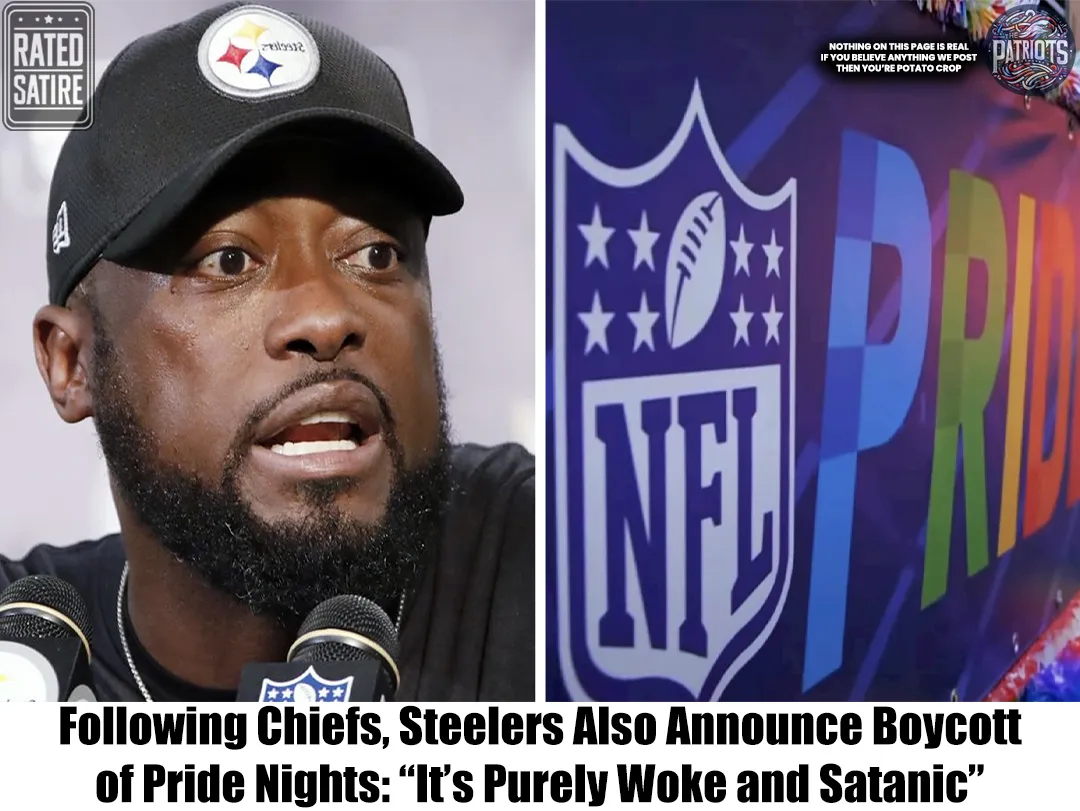In a shocking move that has sent fans, critics, and even Satanists into a tailspin, the Pittsburgh Steelers have announced their official boycott of Pride Nights, citing concerns over what they call the “woke and satanic” nature of the events. The announcement comes hot on the heels of a similar statement by the Kansas City Chiefs, proving that in the world of football, team solidarity might be more important than inclusivity—or common sense.

Steelers head coach Mike Tomlin, known for his no-nonsense approach to the game, stepped up to the podium at a hastily arranged press conference. With his trademark intensity, he declared, “We’re not here to celebrate rainbows, unicorns, or whatever mystical forces these Pride Nights represent. This is about football. And football is about… well, not that.”
Behind him stood a handful of Steelers players nodding solemnly, some clearly unsure of why they were even there, but committed to the bit nonetheless. Tomlin continued, “Look, this team stands for toughness, tradition, and the occasional helmet-swinging brawl. There’s no place for woke or satanic influences in our locker room.”
For those of you keeping score at home, this boycott probably wasn’t in your bingo card for 2024. But in the age of social media outrage and performative gestures, it seems inevitable that at least one NFL team would eventually decide that rainbows were a threat to the very fabric of professional sports. The only surprise here might be that it’s taken this long for the Steelers to follow the Chiefs down this path of sheer absurdity.
According to the official statement released by the Steelers’ PR team (presumably while holding back laughter), the decision to boycott Pride Nights was made after “careful consideration and deep reflection on the values that our organization holds dear.” The statement went on to describe Pride Nights as “an unnecessary distraction” and, confusingly, “a threat to the sanctity of football.
The real kicker? The statement concluded with a curious sentence that has left fans scratching their heads: “We do not believe that dancing mascots, glitter cannons, and flag-waving celebrations are aligned with the principles of hard-nosed football.” One can only assume that nobody in the Steelers’ front office has ever attended a Super Bowl halftime show.
Predictably, the Steelers’ decision to boycott Pride Nights has ignited a firestorm on social media. Twitter (or X, for those still trying to adjust) exploded with reactions ranging from support to complete bewilderment. Die-hard fans of the team seem to be split into two camps: those who see this as an important stand against “woke culture” and those who just want to know if this means fewer rainbow-themed giveaways at the stadium.
“I support the Steelers 100%,” tweeted @IronCityTough78, whose bio proudly proclaims, “God, guns, and gridiron.” “Football has always been about grit, not glitter. Keep your woke agenda out of my Sundays.”
But not everyone is on board. “Woke and satanic? What are they even talking about?” asked @SteelersFanSinceBirth69. “How does supporting LGBTQ+ fans make a football team ‘satanic’? Did I miss the part where rainbows are a gateway to hell?”
Perhaps the most unexpected voice to emerge from the chaos was none other than the Church of Satan itself, which tweeted: “We can confirm that we had nothing to do with Pride Nights. However, we do support glitter.” So at least someone has a sense of humor about the whole thing.
As with any bold and polarizing decision, the players find themselves caught between the organization’s stance and their own personal beliefs. Some players, when asked for comment, seemed hesitant to dive into the controversy.
“Look, I just want to play football,” said Steelers linebacker T.J. Watt when approached by reporters after practice. “I don’t really get involved in the politics of it all. If Coach Tomlin says we’re boycotting something, I’m going to focus on the game plan.”
Others, however, were not so diplomatic. “Honestly, I don’t understand why we’re doing this,” said an unnamed player who requested anonymity for obvious reasons. “It’s just a night where we show support for fans who, you know, happen to be LGBTQ+. I’m pretty sure that doesn’t affect how we perform on the field.”
Some players, especially those more active on social justice issues, have privately expressed concerns over the team’s stance. After all, it’s not exactly easy to promote unity within the team when your organization is picking public fights with the rainbow flag.
With the Steelers following the Chiefs’ lead, other teams now find themselves under the microscope. Fans are wondering which franchise will be the next to jump on the “woke and satanic” bandwagon, as if somehow acknowledging Pride Nights is a slippery slope into a football version of “The Exorcist.”
Teams like the San Francisco 49ers and Seattle Seahawks, which have historically embraced inclusive initiatives, have remained conspicuously silent, perhaps hoping this controversy will pass like a brief commercial break. Meanwhile, some league insiders are speculating that this could lead to even bigger clashes between NFL teams and the league itself, which has made efforts to appeal to a broader audience.
NFL Commissioner Roger Goodell, whose job these days seems to involve navigating between various political landmines, has yet to comment on the Steelers’ boycott. But considering the league’s attempts to balance progress with appeasing its more conservative fanbase, it’s only a matter of time before Goodell finds himself issuing another vague, “We’re all about unity” statement.
The real question now is: What happens next? With Pride Nights off the table, it remains unclear whether the Steelers plan to boycott other events they deem “woke” or “satanic.” Will Breast Cancer Awareness Month be next? After all, those pink towels could be deemed just as “distracting” as rainbow flags. And heaven forbid the NFL hosts another military appreciation night, lest they be accused of weaponizing patriotism.
For now, the Steelers will return to doing what they do best: playing football and pretending like they didn’t just ignite a controversy that nobody asked for. As for the rest of us, we’ll just sit back and enjoy the spectacle of a league where glitter is apparently more threatening than a pass-rush defense.
Because if the Steelers have taught us anything this week, it’s that in the NFL, the real battle isn’t on the field—it’s in the headlines.





